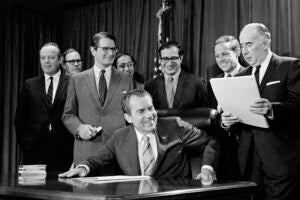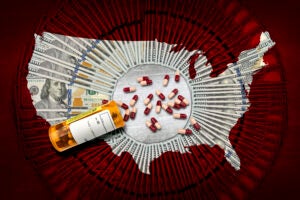People
Carmel Shachar
-
H.I.V. Groups Warn of Privacy Risks in How C.D.C. Tracks Virus Samples
February 12, 2024
The Centers for Disease Control and Prevention on Friday revised its guidelines for tracking the genetic signatures of viruses collected from people newly diagnosed with…
-
Texas Attorney General Ken Paxton is using an exception in federal medical-privacy law to demand records from health-care providers far beyond his state’s borders —…
-
AstraZeneca to Fight Medicare Drug Price Plan in Federal Court
January 30, 2024
A major drugmaker will argue Wednesday that the government price-setting program created to slash prescription drug costs was unlawfully implemented. AstraZeneca PLC and the US…
-
How a legal loophole allows anti-abortion prosecutors to obtain women’s secret health data
January 22, 2024
The American legal system has a message for women concerned about their abortion rights: Don’t make the mistake of thinking that your pharmacist is your…
-
Column: How a legal loophole allows antiabortion prosecutors to obtain women’s secret health data
January 12, 2024
The American legal system has a message for women concerned about their abortion rights: Don’t make the mistake of thinking that your pharmacist is your…
-
The nation’s largest pharmacy chains have handed over Americans’ prescription records to police and government investigators without a warrant, a congressional investigation found, raising concerns…
-
Pharma Cries Procedural Foul in Next Front of Drug Price War
September 13, 2023
The pharmaceutical industry is expanding its attack on President Joe Biden’s plan to lower Medicare drug prices into allegations that the administration violated procedural norms…
-
Big Pharma’s Battle With the Biden Administration Could Have Legs
September 11, 2023
Investors haven’t been taking pharma’s legal effort against President Biden’s drug pricing policy too seriously: When Merck became the first of several entities to sue…
-
Harvard Law expert explains federal government’s push to ease marijuana restrictions
September 5, 2023
Harvard Law Professor Carmel Shachar explains the federal government’s effort to loosen marijuana regulations and argues the 1970s restrictions were always misguided.
-
Drugs Up for Medicare Price Cuts Fuel Drugmakers’ Legal Strategy
September 5, 2023
Drugmakers are poised to change their lawsuits and bring new ones against the Biden administration now that the list of the first 10 drugs subject…
-
How Two FDA Moves Have Quietly Advanced Reproductive Health Care
August 30, 2023
This summer, the US Food and Drug Administration made two decisions that reflect a demand for more access to reproductive health care. In July, it…
-
Drugmakers Prep Medicare Pricing Suits for March to High Court
August 18, 2023
Major drugmakers have tailored a legal crusade against the Biden administration’s drug price negotiation program that legal scholars say appears strategically designed to reach the…
-
Harvard Law School’s Carmel Shachar examines a lawsuit by pharmaceutical giant Merck contesting a provision of the Inflation Reduction Act.
-
Susannah Baruch, an expert in health law policy and ethics, joins Petrie-Flom Center as executive director
June 20, 2023
Susannah Baruch has joined the Petrie-Flom Center for Health Law Policy, Biotechnology, and Bioethics at Harvard Law School as executive director.
-
Doctors, data scientists and hospital executives believe artificial intelligence may help solve what until now have been intractable problems. AI is already showing promise to…
-
Doctors, data scientists and hospital executives believe artificial intelligence may help solve problems that until now have been intractable. Hospitals are already using AI to…
-
51% #1761: The Battle for Mifepristone
April 21, 2023
The accessibility of the key abortion medication mifepristone hangs in the balance after a federal judge in Texas ruled earlier this month to suspend the…
-
New faculty appointments
April 18, 2023
Harvard Law School expands the ranks of its faculty with four appointments.



